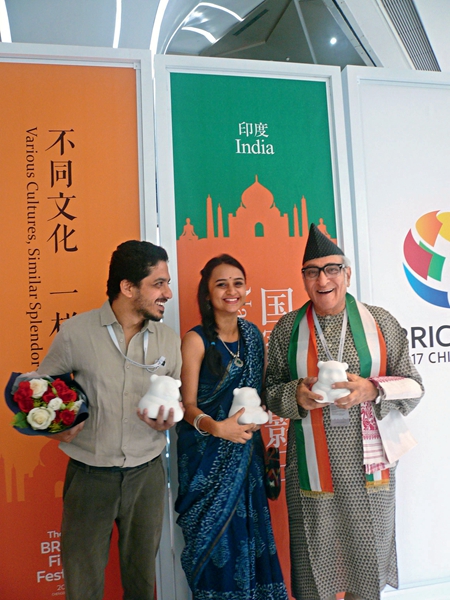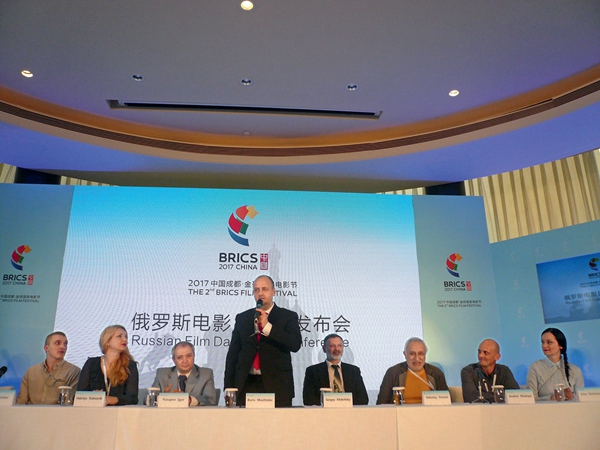By NIU MENGDI
By NIU MENGDI
THE 2017 BRICS Film Festival in Chengdu, part of a series of events of the BRICS Summit of this year, to be held in Xiamen, started on June 23, and lasted five days, screening a total 33 BRICS country films. Among them, 10 films including Soulmate, The Second Mother, and Lady of the Lake competed for a total of five prizes, including best picture. The China-led Where Has the Time Gone?, the first film to have been co-produced by the five BRICS countries, and the South African Mrs. Right Guy, were shown at the opening and closing special screenings during the festival respectively.

In this year’s festival, the five BRICS countries promoted cultural exchange, national understanding, and economic cooperation through film. The head of the Brazilian delegation and Brazilian Ambassador to China Marcos Caramuru de Paiva stated, “My hope is for the five BRICS countries to use the BRICS Film Festival as a platform to further deepen mutual understanding, communication, and exchange.”
The BRICS Film Festival was established in 2016, and each BRICS country takes a turn hosting it every year. The first was held in India, the second in China, and the third will be held in South Africa.
A Joint Production
The opening film Where Has the Time Gone? is the first film to have been co-produced by the five BRICS countries, and the production brought together film directors from China, Russia, India, Brazil, and South Africa, each taking the theme of “Where Has the Time Gone?” to create a short film. Executive producer and director of the Chinese short film Jia Zhangke said, “The theme of ‘time’ corresponds to development in the five BRICS countries: each is in the process of rapid economic growth, all are facing huge social transformations. I hope that through exploring this theme we can follow the changes in individual experiences and community life in these rapidly developing societies.”
The Chinese short film Meeting the Spring, directed by Jia Zhangke, is about the second child policy in China, and tells an emotional story which closely follows the Chinese of today. The Brazilian part is set in the wake of the real-life event of the collapse of a damn at an iron ore mine, and represents the lust for life and hopes for the future in the aftermath of the disaster. The Russian director Aleksei Fedorchenko uses “Breath” as his title, and depicts the complicated emotional redemption of a couple living in seclusion in the mountains. Indian director Madhur Bhandarkar’s Mumbai Mist describes the moving friendship between an old man and a 10-year-old orphan. Rebirth, made by the most watched contemporary South African director Jahmil X.T. Qubeka, describes the story of a female laborer in a virtual future world, who has not reconciled with the idea that the fate of all humans is preordained, and risks her own life in her quest to change her destiny.

“This is an extremely challenging and interesting piece of work.” Jia Zhangke has been very frank in saying that it was not at all easy to find a theme that artists from the five countries with vastly different languages and cultures are all attracted to. “Human emotion is universal, there are no borders.” Where Has the Time Gone? has triggered huge reactions from the audience. South African director Sarah Blecher said, “This film is wonderfully diverse, it’s more than just a film, it allows audiences to experience different cultures.”
China hopes to continue this model for cooperation, and plans to release one co-directed film by BRICS countries every year up until 2021.
Building a Platform for Cooperation
The BRICS Film Festival has been fully engaged in building a platform for friendship and pragmatic and efficient cooperation between the film makers and the film industries of the BRICS countries.
Vice President of the Chinese Academy of Art Jia Leilei said, “It is truly wonderful to see the five BRICS countries taking turns to host this film festival, which not only facilitates cultural exchange between China and the rest of the world, but also breaks down cultural barriers, and defuses the sense of unfamiliarity between each of the BRICS countries. With that brings an abundance of diverse cultures to showcase in front of each of the countries’ peoples.”
President of Bona Film Group Yu Dong described his experience at the Cannes Film Festival: “When the Brazilian producers saw the Chinese film Shock Wave, they thought it wouldn’t be that difficult to make in terms of the story’s plot and character development, and so hoped to take this story and turn it into a Brazilian one, and they got some Brazilian actors and a Brazilian production team to work on it.”
Film co-production is the key for promoting cultural exchange and developing the film industry of the BRICS countries. In producer Han Sanping’s opinion, “Chinese films should not only cooperate in making films with Hollywood, but also with other BRICS countries, to develop the diversity of Chinese films.”
Bringing Hearts Closer
The Indian film Dangal exploded in popularity in China, and quickly became a topic of hot debates amongst the guests from each country at this year’s Road to BRICS Film Cooperation Forum. Chinese film maker Lu Chuan said, “This film made RMB 1.2 billion in ticket sales in China. Its success was entirely based on its passion and the power of its story.” An official of India’s Ministry of Information and Broadcasting stated, “The storyline of this film is very interesting. It is much more than just a sports film; it has a very moving and emotional part to it as well.”

At the forum, producers from BRICS countries said they will take advantage of this mechanism for cooperation between their countries to strengthen and deepen cultural and artistic exchange and cooperation, to make film, the most internationalized, universal, and popular language on earth, serve as an emotional bond between each country’s people.
Executive director of the Russian National Academy for Motion Picture Arts and Sciences and head of the Russian delegation Boris Mashtaler said, “The six Russian movies screened this year show the spirit and vitality of Russia, and through the platform of this film festival, have promoted the exchange of films among the BRICS.” In his opinion, “Film is a language that can be understood by everyone without the need for translation. During the National Film Day events, not only can we screen BRICS country films to audiences of other nations, but it also allows all the film makers to learn from one another and draw from each other’s strengths and inspirations.”
How can you pull the hearts of people closer through co-production of a film? Producer of the Indian film Kasaav: Turtle Mohan Agashe suggested, “Although the current circumstances of each of the five countries are vastly different, there are many problems that we all face, and film is a wonderful medium for solving these common social issues. I propose that the next co-produced film be a silent film, that way the film itself will become a language without borders.”
During the BRICS Film Festival, apart from the decision to create a new BRICS co-produced film every year for the next five years, many other similar cooperative projects, such as a BRICS film talent exchange and training program of Beijing Film Academy, were also announced. The Beijing Film Academy project plans to provide full scholarships to a total of 40 students from other BRICS countries over the next five years, and also start a series of activities including master workshops, and means for research cooperation for visiting scholars.
By using the language of film to narrow the distance between the peoples of the BRICS countries, during this second decade of BRICS cooperation, the five countries will garner even greater achievements in areas of film, business cooperation, and exchange.
NIU MENGDI is a reporter with Guangming Daily.